The paper focuses on the role of banking diversity on access to finance for SMEs in the green economy. It demonstrates the relationship between the green economy and SMEs, and argues that access to finance is not just a function of broader macroeconomic factors but also the structure of the banking system. Specifically, it demonstrates that different types of banks, as a result of differences in balance sheets, lending horizons, and local presence, were equipped differently to service SMEs financing needs. In particular, the analysis highlights the role of non‐commercial banks in a diverse banking sector to provide SME lending. Banking diversity contributed to a better servicing of the different financing needs in the economy and ensures a larger stability in lending to SMES during financial instability.

This year, for the first time ever, nearly all of the world’s countries are making pledges to help limit future climate change. As of 1 October 2015, 147 countries (representing about 85% of global emissions) have submitted their Intended Nationally Determined Contributions. These pledges, if carried out in full, are expected to lower emissions relative to the ‘business as usual’ forecast. However, they are not expected to prevent emissions from increasing above today’s level through 2030. To meet the global goal of limiting mean global temperature change to 2°C relative to the pre-industrial level, much more will need to be done after 2030. Eventually, emissions will have to fall to zero worldwide – either that, or countries will need to remove carbon dioxide directly from the atmosphere. This new Vox eBook looks into what needs to be done to build a climate regime that is both workable and effective.

Unemployment is a major challenge for Europe. The crisis has led to budget cuts and it has made the socio-economic integration of people who have low educational attainment, low skills, a history of longterm unemployment and who are vulnerable even more difficult. At the same time, environmental degradation, climate change and unsustainable development are amongst the most serious threats that our society has to address; the environmental and health costs often outweighing the gains from economic activity.
